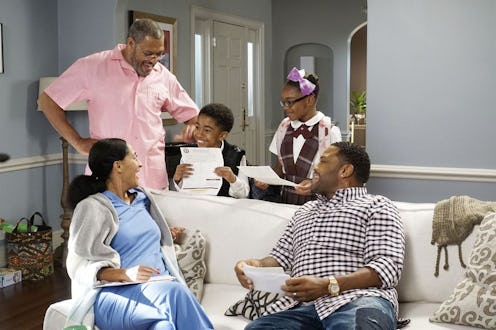Entertainment
'black-ish' Contrasts Class Differences With Humor

After an election night that looks to have changed American culture in serious ways, black-ish debuted an episode that was almost shockingly funny and, without ever mentioning politics, actually address blue collar and white collar class divides, particularly between those who do and don't have a college degree, that have been a major part of the post-election discussion. When Bow and Dre hear that Jack scored "skilled laborer" on his third grade career aptitude test, the two skilled professionals are shocked, not wanting their son to, in their minds, undo the career progress they were able to achieve. But Pops is happy to see one of his grandchildren take on the manual labor that he spent years doing from nine to five, and he can't understand why his son and daughter in law are so shocked.
Jack has always been depicted as a lovable but simple-minded kid, but this episode suggests that maybe he just has more of a knack for trades like plumber, electrician, or carpenter — and to see the kid's face light up, it's hard to disagree that parents should push any specific career paths on their kids besides simply encouraging whatever makes a kid feel empowered, happy, and successful. Ultimately, because of their upper middle class life, they can afford to let their son take on whatever career he wants, free of the intense pressure to build on his parents' foundation.
Both Dre and his father are passionate about their careers, blue collar and white collar. Dre wishes that his son would build on his upper class success, while Pops feels looked down on because blue collar work is considered nothing more than a stepping stone to his son's cushy job testing products (where he's forced to deal with microaggressions and racism).
One thing that feel particularly cathartic is finding humor in this issue, on the first night of what feels like a particularly divided time — college education vs. non-college education, white collar vs. blue collar, and, as the episode reminds us, white vs. any other group. There are even more laughs in the subplot where Ruby becomes convinced that Diane is possessed by the devil, which might not be untrue, given that she's gone from a cute but smart-mouthed little girl to a stone-cold killer.
Of course, the conflict and tension between the elder and younger generation of Johnsons ultimately resolves when they can agree that what matters most is allowing Jack to grow up to be who he wants to be, and shows that black-ish has a valuable place on ABC's Wednesday nights.
Image: Kelsey McNeal/ABC